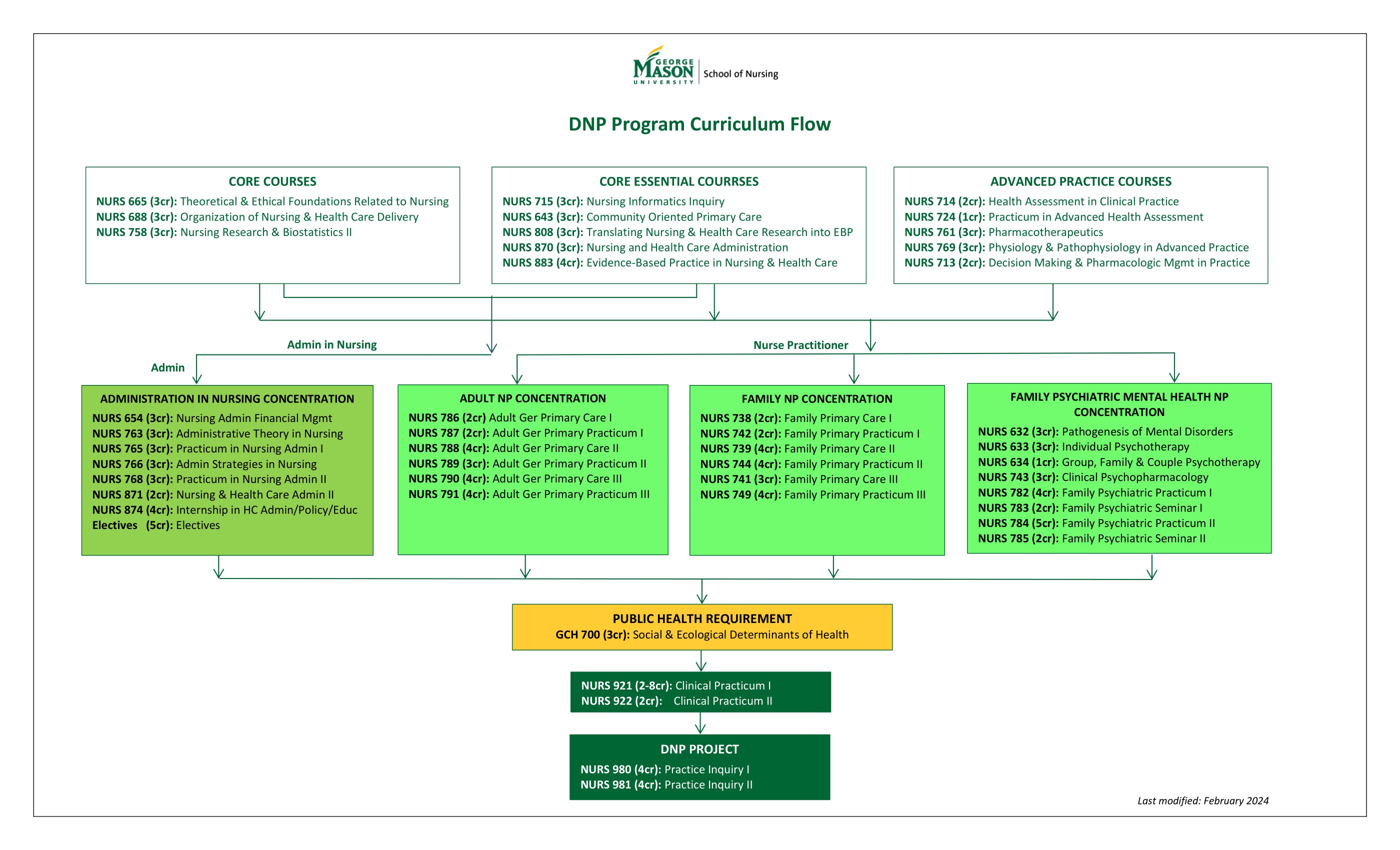About the Program
The DNP is the terminal practice degree in the profession. The objective of the program is to prepare graduates for the highest level of nursing practice as nurse practitioners or nurse administrators. Emphasis is placed on evaluating and applying the evidence that supports practice, understanding and creating practice delivery systems based on patient outcomes, and assuming leadership roles in practice settings.
The curriculum will allow students with diverse nursing academic and clinical backgrounds the flexibility to enter a program of study tailored to their future professional goals. In the curriculum, five concentrations are available. Additional information about the DNP program can also be found in the university catalog.
DNP Curriculum

BSN to DNP Pathway
Students who enter the BSN to DNP program will complete 72 credits and must choose from the following concentrations:
BSN to DNP students complete core courses in theory, ethics, health care delivery systems, and statistics; advanced-practice competency courses relevant to their chosen concentration; and essential doctoral-level courses in policy, administration, informatics, and evidence-based practice.
Preceptored/ Mentored Clinical Hours
All DNP students must complete 1,000 precepted/mentored clinical hours. Students also must complete two practice inquiry project (PIP) courses over two semesters resulting in a scholarly product approved by their PIP committees. Students must take additional electives to meet the 72 credits required to complete the program if needed.
Student Requirements
All nursing students must maintain a current nursing license. Nursing students must meet certain mandatory requirements, including a certified criminal background check, immunizations, and other program-specific requirements. Specific information will be provided once the offer of admission to the nursing program has been accepted.
MSN to DNP Pathway
Students who enter the MSN to DNP program will complete 72 credits. A maximum of 30 credit hours of relevant graduate credit may be awarded for past master's-level courses, and students will complete the minimum of 42 additional credits. Essential courses building on previous master's education must be completed in the first year of full-time study or two years of part-time study.
These courses prepare the student to develop and implement the practice inquiry project in the final two semesters of study. Individualized plans of study are created based on the content from the student's master's degree academic program and include a minimum of 24 credits.
Admission Requirements
Applicants must meet the admission standards and application requirements specified in Graduate Admissions and must apply using the online Application for Graduate Admission. For application deadlines and detailed application requirements, refer to the Admissions page. The application process is competitive, and admissions are considered for both the Fall and Spring semesters.
Preceptored/ Mentored Clinical Hours
All DNP students must complete 1,000 precepted/mentored clinical hours. MSN to DNP students may include documented precepted/mentored clinical hours obtained during previous master's education. The number of hours granted from the master's degree is based on an individual evaluation of master's clinical hours.
Students also must complete two practice inquiry project (PIP) courses over two semesters resulting in a scholarly product approved by their PIP committees. Students must take additional electives to meet the 72 credits required to complete the program.
Student Requirements
All nursing students must maintain a current nursing license. Nursing students must meet certain mandatory requirements, including a certified criminal background check, immunizations, and other program-specific requirements. Specific information will be provided once the offer of admission to the nursing program has been accepted.
Admission Requirements & Deadlines
Applicants must meet the admission standards and application requirements specified in Graduate Admissions and must apply using the online Application for Graduate Admission.
For application deadlines and detailed application requirements, refer to the Admissions page.
The application process is competitive, and admissions are considered for both the Fall and Spring semesters.
Tuition & Fees
For information regarding tuition and fees, please visit the Student Accounts, Tuition and Fees website.
It is important to note that Nursing programs require additional fees.
Scholarships & Financial Aids
The College of Public Health and School of Nursing provides a number of scholarships to students of all levels. Explore scholarship opportunities and application deadlines from the College of Public Health's Scholarship page.
For other scholarships and aids available in the university, please visit the university's page.
National Council of State Authorization Reciprocity Agreements
On October 17, 2014, the Southern Regional Education Board (SREB) approved Virginia as a member state to participate in National Council for State Authorization Reciprocity Agreements (NC-SARA), and on September 8, 2016, George Mason University became an institutional participant in the NC-SARA initiative. With this membership, George Mason University programs are automatically available to students who reside in 49 participating states and U.S. territories that participate in NC-SARA. At present, only California has not yet joined the NC-SARA initiative. However, California law permits its students to enroll in out-of-state programs.
For complete, state/territory-specific information regarding Mason’s authorization to provide distance education, please see the listing at the bottom of this page.
Read more about Mason's authorization to provide distance education from the university's page.

